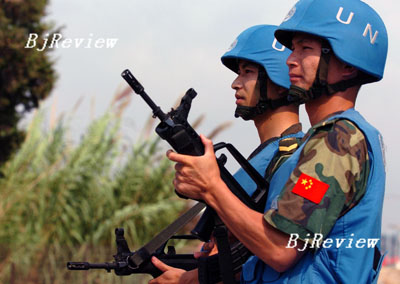
Chen Hu, Executive Chief Editor of the World Military Affairs magazine, shares his analysis of what this responsibility means to China with People’s Daily Online. Excerpts follow:
As China’s overall national strength has increased alongside its rapid economic growth in recent years, much talk has been heard of the country’s need to become “a responsible big nation.” So, as a responsible big nation, just how big should its responsibilities be? It is not easy to answer this question, however, since there are many relevant matters to consider. When the threats of terrorism swept across the world, vehement demands were made on China to cooperate with the international community to jointly respond to these threats; when natural calamities occurred, the international community asked China to grant humanitarian aid or assistance and; when there were crises occurring in Asia or elsewhere in the world, people again required China to help resolve them with its growing influence.
But along with its global responsibilities, China still has a great domestic role to play. It is no trifling matter, from any perspective to guarantee the right of survival and development for its 1.3 billion people. And compared with developed countries, China, as a developing nation, is faced with more challenges, such as those pertaining to energy security, information security and trade security. Even its own national reunification still calls for an urgent solution. Though termed internal responsibilities, any overall issues China is facing can be said to be of global interests, since the country has almost one fifth of the total global population.
This being the case, China’s responsibilities are great.
No nation can take up its responsibilities if it is short of strength and, if it wants to take up more responsibilities, it needs more strength as backup. The strength we are talking about here includes a country’s military power. Nevertheless, whenever China takes steps and makes any progress in its military modernization, there is always uproar to censure it for building up its military capabilities.
It has been said that the progress China makes in the science and technology of its national defense has been too fast, with a trend leading to further acceleration. But what people forget is that the rapid growth of China’s national strength is built on the fact that it has had to catch up with the rest of the world, and to do this it must accelerate its development in science and technology. Compared with advanced world standards, China is now making achievements that have already been available in other advanced countries decades ago.
Critics often say that China’s military modernization process is not transparent enough. As a matter of fact, intelligence is equal to power in the current information age. A nation with a mightier national strength is better able to acquire intelligence data from its adversaries and has much more room to maneuver for the release of such information. Conversely, a nation with a weaker national strength needs a stricter, higher degree of classification of its information, because it is almost impossible for any country to release or publicize its own defense information without reservation. In fact, the speed at which China’s military capabilities are becoming transparent has so far overtaken that of any other sector in the country.
Observers have commented that the development of China’s national strength has violated or broken the regional balance of power. That balance itself is in a dynamic and relative state. In the contemporary world, the national defense spending of an individual country can equal the combined sum of several nations’ military expenses; a single nation can issue threats of war to several countries or even an entire region. Can such a power be said to be in a state of equilibrium? Indeed, only by doing away with the original equilibrium, can the establishment of a more balanced world be facilitated.
In retrospect, where do these comments really come from? They have definitely come from a nation leading or steering trends in the development of military science and technology globally, and from a nation of super-powerful military might with its military deployment spreading worldwide. China is being criticized for developing its third-generation jet fighters when in fact the detractor has already started to equip its armed forces with the most sophisticated fourth-generation warplanes. Under these circumstances, people should stop and think about the real intentions behind the constant raising of the alarms. |
